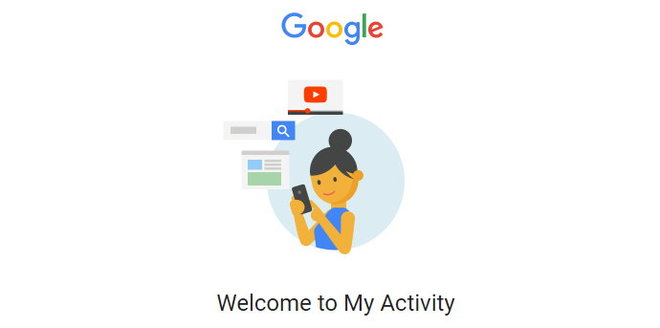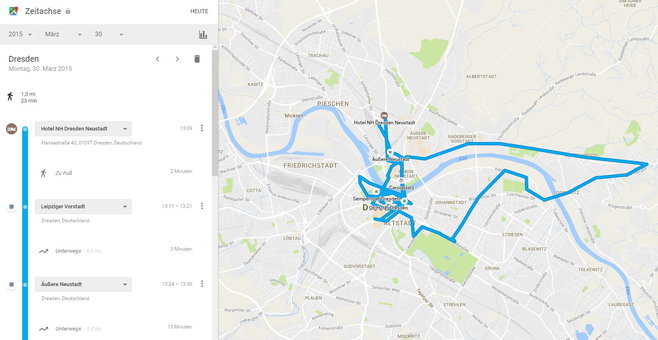When I was young, there was a TV show called "That's your life". A more or less famous person stat in a studio while the host held a book and read out details about various stages of his or her life. Every now and then, an old companion would come rushing in, hug the guest and start chatting about past events. Google has something similar to offer to all of us - and I'm still vacillating between fascination and trepidation.

Google strives to become more transparent and has set up https://myactivity.google.com/myactivity to allow users with a Google account to dive deeply into their (Google) past and find out how much data the search giant has collected about them. This collection not only includes past search queries (that already quite accurately reflect our interests, purchases or activities) but much more! Google Chrome, Maps, Plus, Photos, Hangouts, Calendar, Mail, Youtube - this well of information is more like a bottomless pit.
Where were you on 12 May 2014? Maybe Myactivitiy can help you. Google will store this information in their Google Maps location history, if enabled. This way, I was able to find out that I was at a supermarket in the North of Hamburg in the middle of 2014 and trace back the stages of a past vacation. Every detail was laid out perfectly on a map, movement profiles were available for individual days including departure, itinerary and destination. I don't know about you but I was unaware that location tracking would be so comprehensive. So I clicked my way through individual days and learned (again) when I went shopping, visited friends or went on a side trip.
 That was in Dresden obviously…
That was in Dresden obviously…
Oddities were found under My Activities > Voice & Audio. I had only used voice commands for a brief time before I disabled this feature but that was apparently enough to compile a collection of genuine spoken search queries (good lord, I sound grumpy!) and rather cryptic recordings that were filed under "No transcript available". I listened to myself while driving, heard a TV newscaster read out the news and another person coughing. Something must have gone wrong, maybe I accidentally activated this feature while I kept my cellphone in my pocket or ordinary conversations were misinterpreted as voice commands. Mildly scary.
To be fair, you can freely delete or disable features in this portion of your Google account and, honestly, I wouldn't have thought that Google would even offer this option in the first place. Delete single days or entire timelines, the choice is yours. They have also tried to make access to these powerful databases as easy and intuitive as possible, most likely to counteract common accusations of data hogging. How much you trust these features (including the delete option!) is up to you.
Personalized ads is where it gets interesting. You can decide whether Google will use their data to present you with custom ads, tailored to your (alleged) needs, or generic offers. If you disable this feature, you will still see ads but they won't target specific interests. Not an easy decision. Do I prefer generic ads that target the general population or offers that might genuinely interest me?
Finally, I wanted to know exactly how much data Google collected about me. Luckily, I could download the entire archive which, in my case, spanned four separate Zip archives of 7.3 GB each. This data stems from 24 different services and reviewing it would require several days of intensive work. I'll wager that no secret service agency in the world has collected as much data about me as Google has. The strange thing is that this actually makes my life easier and saves me time. My interests and habits are known to Google and that makes navigation, searching, cloud usage or shopping more straightforward. And decent service requires a solid data foundation: the computers in Star Trek Enterprise are so smart because they know so much about the ship and its crew. But that's off topic and maybe material for another article.

L et's face it: We all know that the various Google services only exist as long as we offer our data in return. If you use them you agree to that. Yet it's remarkable that Google is somewhat coming clean about its data collection business (although I don't believe I've actually seen everything they have on me) and allows users to review this data. This practice has two effects on me: I respect their endeavor to become more open and I find it mildly scary to see how much they already know about me. Knowing that data is being collected is not the same as actually seeing the results. I deleted and disabled a lot but I now have to think long and hard whether I will continue to use Google.
Are you still going to use Google and would you like to keep data hogging to a minimum? No problem, disable logging for web, app, voice and audio activities, device information and the Youtube (search) history. Simply go through each item on the page and delete as much as you can. You might also want to consider turning your back on Google altogether and start using alternatives such as http://www.ixquick.com, http://www.openstreetmap.org, http://www.duckduckgo.com or http://www.startpage.com. These are search engines and maps that aren't as data hungry as Google. They may not be as comfortable or convenient (since they haven't and won't collect as much data about you) but they work. See for yourself!




do you know what happen to webferret.com,ferretsoft it just stopped showing up any news about it Sevn?
Development of Webferret has ceased since version 6.0 which was released in 2010. I doubt we’ll ever hear from them again.
Hello there,
I've been using Startpage with Firefox for a few years, and find that the way it actually uses the Google search engine, but from behind a digital "screen" works very well. The tagline on the home page is "enhanced by Google". Startpage also claims that search engines provide results based on what the provider knows about you, rather than unbiased results. Sounds feasible, but I wouldn't know.
The only thing I miss is the ever-changing, usually amusing Google logo.
Use of Google tracking would be a boon to criminals if it was accepted by the courts. Just get someone to take your Google device to the next City while you commit a crime and then have them return it to you when they return.
This also applies where you try to use it to prove you were at work, have a workmate take it to work as proof, better still take turns at having long weekends.
Thanks, I kind of like to keep my life style personal.
Great article.
I think many people would think differently if Google displayed and played messages that told people exactly what they are doing; like a voice saying, "We're watching you", or, "We know where you are and where you are going.", or "We are keeping that picture you posted". Kind of creepy, eh? Well, it is.
Imagine if for every user of Google, a person followed you around everywhere you went, taking notes of your activity, and pushing ads in front of you, "You might like to buy this".
It is simply stalking, which I am sure has some criminal element to it. Just because it's on the internet, does not make it morally acceptable. People would not give up their life, their friends contact details, or give photos to a stranger, but freely give it away to a company that profits from it. It really is absurd when you think beyond something people think is a free lunch.
At 86 years old, I have no problem with my data being gathered by Google. There may be a day when I can't remember as well as I can now and Google won't lose it's temper with me while I try to find out where I live or what my relatives names are. You never know, one day I may need an alibi and I can go on Google and prove where I was at the time. No need to keep saying "it wasn't me sir" go on Google and see for yourself""
A year ago I was still concerned about recording my activity and infringing my privacy in Google, in Facebook etc. But today I care much less. Google became a golden standard (fortunately or unfortunately) with Android users. I have 5 Android gadgets at the moment including two from Sony and three from Chinese manufactures, and I am pretty content with them. Unless you're stubborn Mac/Apple fan, there is no reason why not purchase and use an Android phone, tablet, watch etc.
So, Google enters your life the moment you switch on your Android device. Again, today, I'm not sure it's bad. I like that my phone, laptop, office PC, tablet and watch are all synchronised and have my own personal settings always and everywhere. I don't care about collecting my location info because I'm not a spy and I'm not hiding from my gf. Moreover, the location history really helped me a couple of months ago when I forgot my employee card and needed to prove to the HR manager that I was in the office that day. Showing my arrival and day location in the Googles map completely convinced him. :)
Remembering my searches in Google and in YouTube also sometimes helps. Yes, of course, you can turn off or delete your whole activity from time to time, but do you really want that?
I'm only still negative about ads. :)
Forgive me for correcting your memory of your old program. In the UK this program was called "This is Your Life" and starred Eamonn Andrews as the presenter during the late 1950s and 1960s.
Wiser not to give Google any information if you wish for a little privacy!
I wonder what Google does with all this information. Who on earth is going to be interested in the fact that I visited my old dad on the 4th September, or that I recently searched for the name of my old school pal who emigrated to Australia?
As for targeted ads, I find these mostly laughable. As soon as I've bought something online, I seem to get an endless series of ads *for that very thing*!
Sorry chaps, I've just bought one - doesn't that make me the most pointless person on earth to advertise it to?
They collect data for personalized ads but it doesn’t always work as planned (not for you and not for many others). They are constantly trying to sell me travelling companions for England when they should have started advertising the Scottish and Irish counterparts to me a while ago. Google, do something! :)
This is Your Life was also a program in the UK from 1955-2003
I've tried other search engines, but end up going back to Google. Suppose the free lunch cannot be totally free, but similar to Facebook, and other things we want to use, we don't get a choice when we have to agree to the terms and conditions which are always more draconian than I would like them to be, but if we said no to everything life would grind to an abrupt halt. Just think, if you refused to sign anything at all, out of protest about terms and conditions in general especially where you are offered no choice about what you do and don't accept - all or nothing - you would have no job to go to and would most likely become homeless and probably end up in jail. Nice that we at last have access to some of what Google is tracking, they are probably worried and covering their backs for the future. You could waste your whole life reading terms and conditions these days.
I never expected the mere mentioning of a TV show would attract so many comments. :) I happen to be German and German TV stations tend to steal *any idea* they can get their hands on. That’s why the series was called “Das ist Ihr Leben” and it was quite sleep-inducing to be honest.
Maybe we lack exciting TV personalities?
Hi Mr Krumrey,
In the late fifties and early sixties we got an Irishman Eamon Andrews and his life book hosting This is your Life I used to enjoy it immensly .... I am sure that it wouldn't be so interesting now especially to a daft young teenage ...believer as I was then!
As for our personal privacy ...what do we know about data gathering or anything else for that matter. The prevailing intelligentsia orchestrate our reality like the musical score of a film . The great majority of us don't question it since they/we can do nothing about.... it ....
Let it suffice to acknowledge that we live in interesting times even though we never know the score . Are Goldfish aware of the presence of water?
A very Interesting post, it was only 5 weeks ago that someone showed me what was held at https://myactivity.google.com/myactivity if you had a Google Account. I live a pretty dull life with nothing to hide so it does not bother me. Intelligent commentators like yourself image in that the state could use all this information but I am pretty sure that much of the UK police and government could not join all this information up to save their lives.
If they did the possibilities would be huge - reduce traffic congestion, improve services, improve planning but it is only brighter people not in the public sector which can see the opportunities.
This Ted.com talk highlights how data could be used https://www.ted.com/talks/ben_wellington_how_we_found_the_worst_place_to_park_in_new_york_city_using_big_data?language=en way beyond the imagination of government agencies.
Awesome information. I have deleted everything and requested stop tracking.
The TV program you referenced was probably "This is Your Life" (1952-61) starring Ralph Edwards as host.